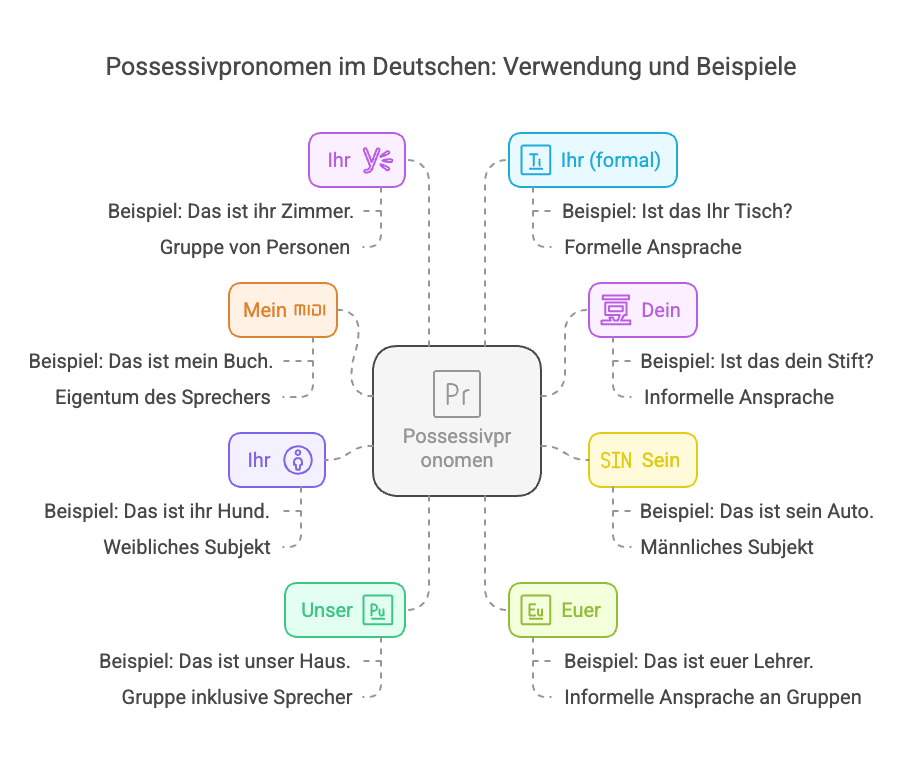Possessive pronouns in German
Possessive pronouns are used to show ownership or possession. In German, these pronouns change depending on the person you are talking about and the gender of the noun they refer to.
1. List of Possessive Pronouns
Here is a list of the most common possessive pronouns in German:

| Pronoun | English Translation | Example in German | English Translation |
|---|---|---|---|
| mein | my | Das ist mein Buch. | This is my book. |
| dein | your (singular, informal) | Das ist dein Stift. | This is your pen. |
| sein | his | Das ist sein Auto. | This is his car. |
| ihr | her | Das ist ihr Hund. | This is her dog. |
| unser | our | Das ist unser Haus. | This is our house. |
| euer | your (plural, informal) | Das ist euer Lehrer. | This is your teacher. |
| ihr | their | Das ist ihr Zimmer. | This is their room. |
| Ihr | your (formal) | Das ist Ihr Tisch. | This is your table. |
2. Usage of Possessive Pronouns
- Mein: Use this pronoun when talking about something that belongs to you.
- Example: Das ist mein Buch. (This is my book.)
- Dein: Use this pronoun when addressing one person informally to indicate something that belongs to them.
- Example: Ist das dein Stift? (Is that your pen?)
- Sein: Use this pronoun when referring to something that belongs to a male person.
- Example: Das ist sein Auto. (This is his car.)
- Ihr: Use this pronoun when referring to something that belongs to a female person.
- Example: Das ist ihr Hund. (This is her dog.)
- Unser: Use this pronoun when talking about something that belongs to a group that includes yourself.
- Example: Das ist unser Haus. (This is our house.)
- Euer: Use this pronoun when addressing a group of people informally.
- Example: Das ist euer Lehrer. (This is your teacher.)
- Ihr: Use this pronoun when referring to something that belongs to a group of people.
- Example: Das ist ihr Zimmer. (This is their room.)
- Ihr (formal): This form is used in formal situations to show respect.
- Example: Ist das Ihr Tisch? (Is that your table?)
3. Important Highlights
- Genders Matter: Possessive pronouns agree in gender and number with the noun they modify. For example, “mein” changes to “meine” for feminine nouns.
- Example: Das ist meine Katze. (This is my cat.)
- Forms Change: The endings of possessive pronouns change based on the grammatical case (nominative, accusative, etc.) and the gender of the noun.
- Example:
- Nominative: mein (masculine), meine (feminine), mein (neuter)
- Accusative: meinen (masculine), meine (feminine), mein (neuter)
- Example:
4. Practice Examples
- Das ist mein Freund. (This is my friend.)
- Ist das dein Buch? (Is that your book?)
- Sein Auto ist blau. (His car is blue.)
- Ihr Hund ist freundlich. (Her dog is friendly.)
- Unser Lehrer ist nett. (Our teacher is nice.)
- Euer Haus ist groß. (Your house is big.)
- Ihr Zimmer ist sauber. (Their room is clean.)
- Ist das Ihr Computer? (Is that your computer?)
By using possessive pronouns, you can clearly show ownership and make your sentences more informative. Practice using them in conversations to improve your German skills!
